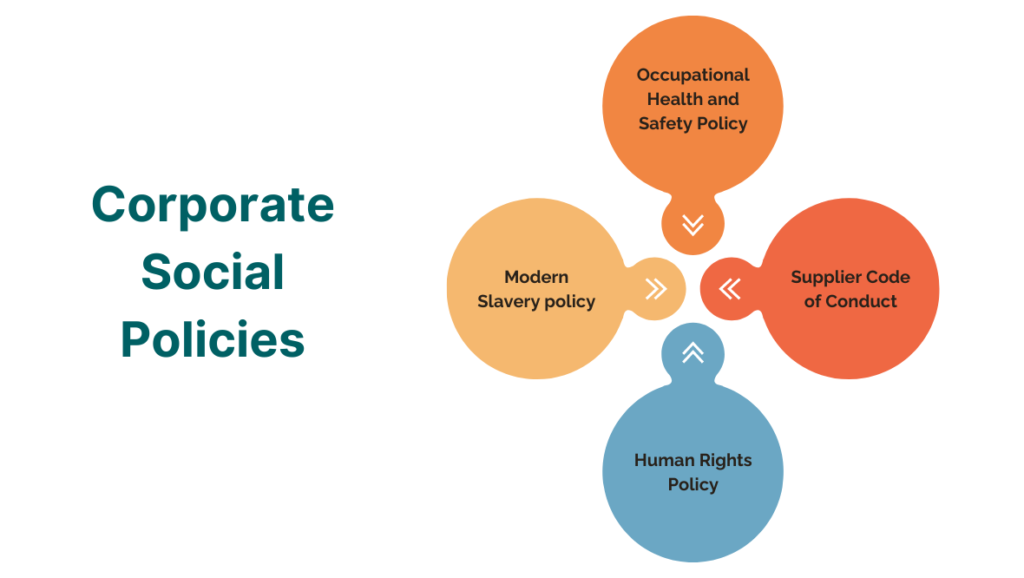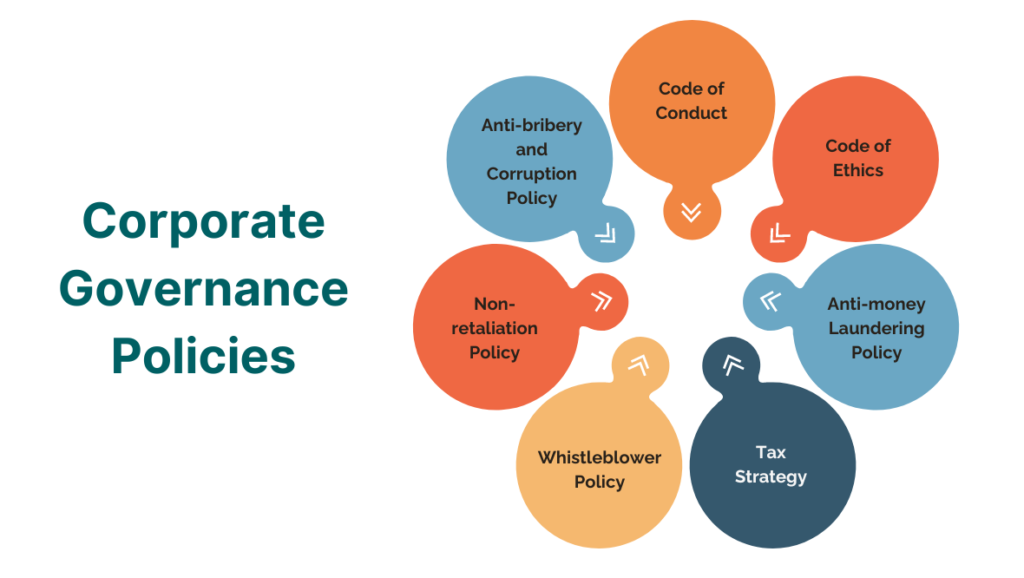ESG Policies: A Comprehensive Guide For Businesses

Gain an in-depth understanding of ESG policies with our comprehensive guide tailored for businesses aiming to enhance sustainability practices.
As industries transition toward embedding sustainability in their operations, businesses are increasingly called upon to operate with a focus on environmental, social, and governance (ESG) factors. This is where ESG policies come into play. ESG policies serve as a critical roadmap, outlining a company’s formal commitment to sustainable practices and ethical behaviour across its operations.
Think of them as formal declarations, similar to other corporate policies, that establish guiding principles and procedures. These principles act as a compass for the company’s actions, ensuring alignment with its business objectives while considering environmental and social impacts. Corporate ESG policies express management’s intention and establish clear expectations for stakeholders, including employees, investors, and supply chain partners. By making these policies readily available, companies showcase transparency and accountability, demonstrating their commitment to responsible business practices throughout their ecosystem.
This comprehensive guide provides an overview of the various ESG policies, their contents and what advantages they offer to businesses. Whether you’re a seasoned sustainability professional or just starting your ESG journey, this guide will equip you with the knowledge and tools to navigate the ever-evolving landscape of responsible business practices.
(E) Environmental
Environmental Policy
An environmental policy serves as the cornerstone of a company’s commitment to sustainability. It outlines the specific ways the company manages its environmental impact in its day-to-day operations. This includes details on the environmental management system implemented, outlining processes, procedures, and responsibilities for minimising environmental footprint.
Crucially, this policy also establishes clear environmental targets. These targets might include areas like energy consumption, waste reduction, or resource utilisation and outlines a roadmap for achieving these targets. This demonstrates a commitment to continuous improvement and a proactive approach to environmental responsibility.
Want to know more about Environmental Policy? Click to read our in-depth article on the topic.

(S) Social
Occupational Health and Safety Policy
An occupational health and safety (OHS) policy outlines the specific rules and procedures implemented to minimise workplace risks and ensure employee safety across all organisational tasks.
An effective OHS policy goes beyond simply outlining regulations. It establishes a culture of prevention by proactively identifying potential hazards and implementing control measures. This may involve providing personal protective equipment (PPE), conducting regular safety training sessions, and implementing open communication channels for employees to report any safety concerns.
The policy should also detail incident reporting procedures, ensuring clear guidelines for employees to follow in case of accidents or near misses. This allows for a swift response, investigation, and implementation of corrective actions to prevent similar incidents in the future.
By prioritising employee health and safety through a comprehensive OHS policy, companies demonstrate their commitment to creating a safe and healthy work environment.
Supplier Code of Conduct
A supplier code of conduct establishes a framework for ethical and sustainable practices throughout a company’s supply chain. It acts as a soft measure to guide supplier behaviour, outlining the desired conduct the company expects from its partners.
An effective supplier code of conduct typically addresses areas like labour practices, environmental responsibility, and business ethics. It might set standards for fair wages, safe working conditions, and adherence to anti-discrimination policies. Additionally, it could encourage suppliers to adopt sustainable practices in their operations, such as minimising waste or reducing energy consumption.
The supplier code of conduct allows for open dialogue about expectations and possibly providing resources or support to help suppliers improve their ESG performance. This helps companies ensure that their entire supply chain operates with social responsibility and environmental awareness, and therefore mitigating potential risks.
Human Rights Policy
A human rights policy demonstrates a company’s commitment to upholding ethical and respectful practices across its operations. It outlines how the company integrates human rights considerations into decision-making and everyday activities. Additionally, it establishes human rights targets, reflecting the company’s aspirations to continuously improve its impact.
An effective human rights policy identifies potential human rights risks associated with the company’s business activities. This might involve risks within the company itself, such as discrimination in hiring practices, or within its supply chain, where labour exploitation could be a concern. The policy then outlines concrete steps to mitigate these risks. This could involve establishing grievance mechanisms for employees to report human rights violations, conducting human rights due diligence on suppliers, or partnering with NGOs to promote human rights awareness.
Modern Slavery Policy
A modern slavery policy is an important document that showcases a company’s commitment to prevent labour practices that would qualify as modern slavery in any form in its operations or along its value chain. Modern slavery, is defined as the recruitment and exploitation of individuals through coercion, abuse of vulnerability, or force.
Drawing inspiration from the UK’s Modern Slavery Act 2015, this policy outlines how the company actively manages risks associated with modern slavery, specifically within its supply chain. The core objective is to prevent the exploitation of workers through practices like forced labour or human trafficking.
The policy details concrete actions the company takes to mitigate these risks. This may involve conducting supply chain audits to identify potential areas of exploitation, establishing clear guidelines for supplier selection that prioritise ethical practices, and providing training for employees to recognize and report potential instances of modern slavery.
Having a modern slavery policy in place is a great tool if your company is working in the UK market, or optionally if it is doing business in any field of industry that could be considered high risk, eg. with seasonal agricultural workers, garment workers, valuable metals, etc.

(G) Governance
Code of Conduct
A code of conduct serves as the foundation for ethical behaviour within an organisation. It’s a general policy applicable to all employees, outlining the core principles, standards, and ethical expectations the company upholds. It guides employee conduct both internally and externally, including interactions with colleagues and representing the company to the outside world.
A code of conduct should be a living document, readily accessible to all employees. Companies often organise training sessions to ensure everyone understands the code’s contents and its implications for their daily work. Additionally, mechanisms for reporting potential violations should be clearly outlined, allowing employees to voice concerns without fear of retaliation.
By establishing and communicating a clear code of conduct and embedding a culture of ethical behaviour across their operations, companies can build trust with stakeholders, enhance their reputation, and mitigate risks associated with unethical conduct.
Code of Ethics
While often integrated within a code of conduct, a code of ethics can also exist as a stand alone policy showcasing a company’s ethical tenets focusing specifically on the moral and ethical principles that guide employee behaviour. This policy serves as a compass, helping employees make ethical decisions in day-to-day situations, ensuring that their actions align with the company’s core values.
Anti-bribery and Corruption Policy
An anti-bribery and corruption (ABC) policy ensures its compliance with anti-corruption regulations worldwide. This policy outlines the management system and principles established to comply with international regulations like the US Foreign Corrupt Practices Act (FCPA) and the UK Bribery Act 2010 in addition to similar anti-corruption regulation in countries where the company operates.
Beyond legal compliance, a strong ABC policy establishes clear ethical principles regarding bribery and corruption for both the company and its employees. It typically details prohibited activities, such as offering or accepting bribes, gifts exceeding a predefined value, or facilitation payments. It also outlines clear procedures for reporting suspected violations, allowing employees to raise concerns without fear of retaliation. Effective implementation of an ABC policy typically involves training programs to educate employees on anti-corruption best practices and red flags to watch out for.
Anti-money Laundering Policy
An anti-money laundering (AML) policy, outlines a management system with measures and safeguards to combat money laundering within your organisation’s operations. While commonly associated with financial institutions, AML policies are increasingly important across all industries. This is because criminals may attempt to launder money through various means, regardless of the specific business sector. An AML policy helps ensure your company can identify the legitimate source of funds, preventing involvement in money laundering activities.
Whistleblower policy
A whistleblower policy is a clear and accessible document that outlines how employees can report suspected wrongdoing within the company. This document outlines the following key points:
- Management System: It details the procedures in place for receiving and handling whistleblower reports.
- Reporting Channels: The policy specifies various ways you can report concerns, such as hotlines, email addresses, or designated personnel.
- Designated Receivers: It identifies who within the company is responsible for receiving and investigating whistleblower reports.
- Confidentiality: The policy assures you that your identity will be protected to the fullest extent possible during the investigation.
- Reporting Process: It outlines the steps you can expect after making a report, including how the company will investigate and address your concerns.
Non-Retaliation Policy
A non-retaliation policy is closely linked to a whistleblower policy. It can either be a standalone document, or an integrated section of the whistleblower policy itself. The purpose of this policy is to ensure a safe space for employees to report wrongdoing without fear of reprisal.
A non-retaliation policy outlines the systems the company has in place to prevent retaliation against employees who raise concerns in good faith. This might involve prohibition clauses against any form of retaliation, such as threats, demotions, or unfair treatment. Additionally, the policy should also detail reporting channels specifically for retaliation concerns, allowing employees to report instances where they feel they’ve been targeted for whistleblowing.
A strong non-retaliation policy promotes a culture of trust and accountability within the organisation. Employees who witness misconduct feel empowered to speak up, knowing they will be protected. This not only helps identify and address potential wrongdoing but also deters future misconduct and strengthens the company’s ethical foundation.
Tax Strategy
A tax strategy outlines the principles that guide a company’s approach to tax planning and compliance. This document serves a dual purpose:
- Internal Governance: For the company, the tax strategy clarifies its commitment to responsible tax practices. It defines how the company manages its tax obligations while minimising tax risks and maximising shareholder value.
- External Transparency: For stakeholders, the tax strategy provides transparency into the company’s tax behaviour. This is particularly valuable for investors and shareholders who can assess potential tax-related risks associated with their investment decisions.
While publishing a tax strategy is mandatory for large companies in the UK, the EU also recommends it as a best practice for corporate governance. By making this document publicly available, companies demonstrate their commitment to operating within the legal and ethical boundaries of tax regulations. A well-defined tax strategy might detail specific approaches to tax planning, transfer pricing practices, and engagement with tax authorities.
Co-written, edited and updated by Saumya Tyagi


